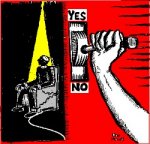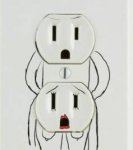You are using an out of date browser. It may not display this or other websites correctly.
You should upgrade or use an alternative browser.
You should upgrade or use an alternative browser.
That's a Switch!
- Thread starter BroKen_H
- Start date
NotThatBright
New member
NotThatBright
New member
Ah. The Milgram Switch.
Slightly different principle. The Milgram Switch we use in America channels a lethal amount of electricity to the subject, and we have no interest in studying his behavior. We extrapolated the Milgram methodology out. Or something.
NotThatBright
New member
Actually, this switch is a MORE-ON switch. If your MORE-ON switch is on, everyone else can tell....
...and I just demonstrated why I came to pick this name for myself. Sometimes the lights are on, but nobody's home!

NotThatBright
New member
Ha! The eyebrows are awesome.
dobro
Well-known member
Slightly different principle. The Milgram Switch we use in America channels a lethal amount of electricity to the subject, and we have no interest in studying his behavior. We extrapolated the Milgram methodology out. Or something.
Actually the Milgram Switch is a variation on the MoreOn Switch whereby flipping the switch sheds light on stupid behavior.
There were two interesting parts of that experiment. One was the experiment itself, and the second was the debate about whether the experiment was ethical. I've heard that it impacted the lives of some of the participants pretty heavily.
dobro
Well-known member
Here's another experiment somebody did that was then criticized for being slightly unethical. It was set up to see if it was true that the expectations a teacher has of a class actually affects the behavior of that class. They had three classes - some bright kids, some average kids, some slow kids - and they had three groups of teachers. The gave the average kids to one group of teachers but told them they were getting the bright kids. They gave the second group of teachers the bright kids but told them they were getting the average bunch. They gave a third group of teachers the dummies and told them they were getting the dummies. They tested all the groups later on. The dummies performed as you'd expect - they got the lowest scores. But the average kids got higher scores than the bright kids. The conclusion drawn was that teacher expectations of a student or a whole class is really critical to that student's/class's performance.
Another conclusion that some people drew was that it was unethical to mess around with a whole year's schooling for a bunch of kids. But that's another question.
It makes you wonder, though. Do sexually attractive people perform more enthusiastically in bed because their partners expect them to be hot? Just asking...
Another conclusion that some people drew was that it was unethical to mess around with a whole year's schooling for a bunch of kids. But that's another question.
It makes you wonder, though. Do sexually attractive people perform more enthusiastically in bed because their partners expect them to be hot? Just asking...
SeaGtGruff
Member
NotThatBright
New member
Actually the Milgram Switch is a variation on the MoreOn Switch whereby flipping the switch sheds light on stupid behavior.
There were two interesting parts of that experiment. One was the experiment itself, and the second was the debate about whether the experiment was ethical. I've heard that it impacted the lives of some of the participants pretty heavily.
I remember reading something about it a long time ago. After all this time I remembered him being like a B.F. Skinner of sorts, doing some kind of experiment to predict human behavior, but I guess I didn't remember much.
dobro said:There were two interesting parts of that experiment. One was the experiment itself, and the second was the debate about whether the experiment was ethical. I've heard that it impacted the lives of some of the participants pretty heavily.
This reminds me of some show I saw on the Unabomber once... apparently he was a pretty normal, relatively happy kid (though with a genius IQ), until he volunteered to be part of some study in college. The study consisted of law students, who had been trained specifically for this, basically questioning him, picking apart his answers, attacking him psychologically, that sort of thing. They said he was never the same after that, he basically withdrew from people and never trusted anyone again.
NotThatBright
New member
Here's another experiment somebody did that was then criticized for being slightly unethical. It was set up to see if it was true that the expectations a teacher has of a class actually affects the behavior of that class. They had three classes - some bright kids, some average kids, some slow kids - and they had three groups of teachers. The gave the average kids to one group of teachers but told them they were getting the bright kids. They gave the second group of teachers the bright kids but told them they were getting the average bunch. They gave a third group of teachers the dummies and told them they were getting the dummies. They tested all the groups later on. The dummies performed as you'd expect - they got the lowest scores. But the average kids got higher scores than the bright kids. The conclusion drawn was that teacher expectations of a student or a whole class is really critical to that student's/class's performance.
Well, they seem to be skipping a step here. The conclusion should be that the teacher's expectations of a student or class is critical to the way she will perform her teaching duties, which will have an effect on the performance of the class.
dobro said:Another conclusion that some people drew was that it was unethical to mess around with a whole year's schooling for a bunch of kids. But that's another question.
Fuck the kids! And fuck the teachers, too. Especially the teachers.
dobro said:It makes you wonder, though. Do sexually attractive people perform more enthusiastically in bed because their partners expect them to be hot? Just asking...
Well, I can't speak for all handsome men, but as a handsome man myself, I can say that this does not occur. Only enthusiastic if it's the first time with the girl, and/or if I'm drunk or on something... otherwise, she's on top, and I'm going to relax.
Of course, the converse situation is true for girls.. everyone knows that fat and/or homely chicks give the best BJs. Why? Because they have to!

Anders Erisian
XLIII
It makes you wonder, though. Do sexually attractive people perform more enthusiastically in bed because their partners expect them to be hot? Just asking...
I do have some anecdotal evidence to suggest this is not the case, interpret that as you will. I will endeavour to do some more scientifically sound studies into this, i'm happy to share some data with you, just to help you out.
As an undergrad student, i was required to participate in some post grad psych experiments, which counted as 10% toward your final grade. I did a sleep deprivation one and a couple of polygraph tests. In one polygraph test i was required to answer a series of questions truthfully. It was all rolling along nicely until i got the question, "who is your favourite actress" This flustered me a bit, and i couldn't think of one, images of Marilyn Monroe, Eve Marie Saint, Audrey Hepburn, Sophia Loren were racing around my mind so i just said i don't have one. The operator shut it down and said that was not a valid answer. I told them it was truthful, to be told it didn't matter, and i had to give a name, their suggestion was "Kim Basinger will do." WTF? I thought about arguing the point, but by that stage i was so keen to get the hell out of there, i just begrudgingly did as i was told and mumbled out Kim Basinger. I don't think I've ever fully recovered from that moment, and it may well have changed me for the worse, forevermore.
Damn unethical scientists

dobro
Well-known member
Well, they seem to be skipping a step here. The conclusion should be that the teacher's expectations of a student or class is critical to the way she will perform her teaching duties, which will have an effect on the performance of the class.
I don't think that was what the study was saying, actually. I think that what makes the difference is simply the expectation that a teacher (or a parent) has of the kid. If the expectation is 'you're going to get this and do well' the kid tends to get it and do well. It's about teacher attitude, not teacher behavior.
NotThatBright
New member
I don't think that was what the study was saying, actually. I think that what makes the difference is simply the expectation that a teacher (or a parent) has of the kid. If the expectation is 'you're going to get this and do well' the kid tends to get it and do well. It's about teacher attitude, not teacher behavior.
With a different attitude comes different behavior, though. A teacher might give a good student the hall pass more often than some lowlife who just takes up space.
For instance, she treats little Johnny like it's a foregone conclusion that he's going to get an A on this paper, because Johnny's a fucking genius, he just doesn't know it yet. Teacher shows Johnny the respect she would show another adult. Johnny's confidence level rises, he realizes, "maybe I'm worth something after all," starts exhibiting the behavior of a winner, and he gets an A on the paper through his own effort.
Is it about raising a kid's self-esteem so he at least gives himself a fair chance before summarily giving up on himself?
NotThatBright
New member
I do have some anecdotal evidence to suggest this is not the case, interpret that as you will. I will endeavour to do some more scientifically sound studies into this, i'm happy to share some data with you, just to help you out.
As an undergrad student, i was required to participate in some post grad psych experiments, which counted as 10% toward your final grade. I did a sleep deprivation one and a couple of polygraph tests. In one polygraph test i was required to answer a series of questions truthfully. It was all rolling along nicely until i got the question, "who is your favourite actress" This flustered me a bit, and i couldn't think of one, images of Marilyn Monroe, Eve Marie Saint, Audrey Hepburn, Sophia Loren were racing around my mind so i just said i don't have one. The operator shut it down and said that was not a valid answer. I told them it was truthful, to be told it didn't matter, and i had to give a name, their suggestion was "Kim Basinger will do." WTF? I thought about arguing the point, but by that stage i was so keen to get the hell out of there, i just begrudgingly did as i was told and mumbled out Kim Basinger. I don't think I've ever fully recovered from that moment, and it may well have changed me for the worse, forevermore.
Damn unethical scientists
How accurate were the polygraphs with the questions you answered? They only measure how nervous you get, right?
dobro
Well-known member
Is it about raising a kid's self-esteem so he at least gives himself a fair chance before summarily giving up on himself?
I think we respond positively to being seen positively. Apparently, to become expert at something, we need two things: time, and a good coach. The coach gives feedback that you can't supply yourself, but the coach also provides you with encouragement and challenge. And positive self-esteem, if not overtly, then through the very fact of all that fucking time he's investing in you. I think the clinic's a kind of coach.




